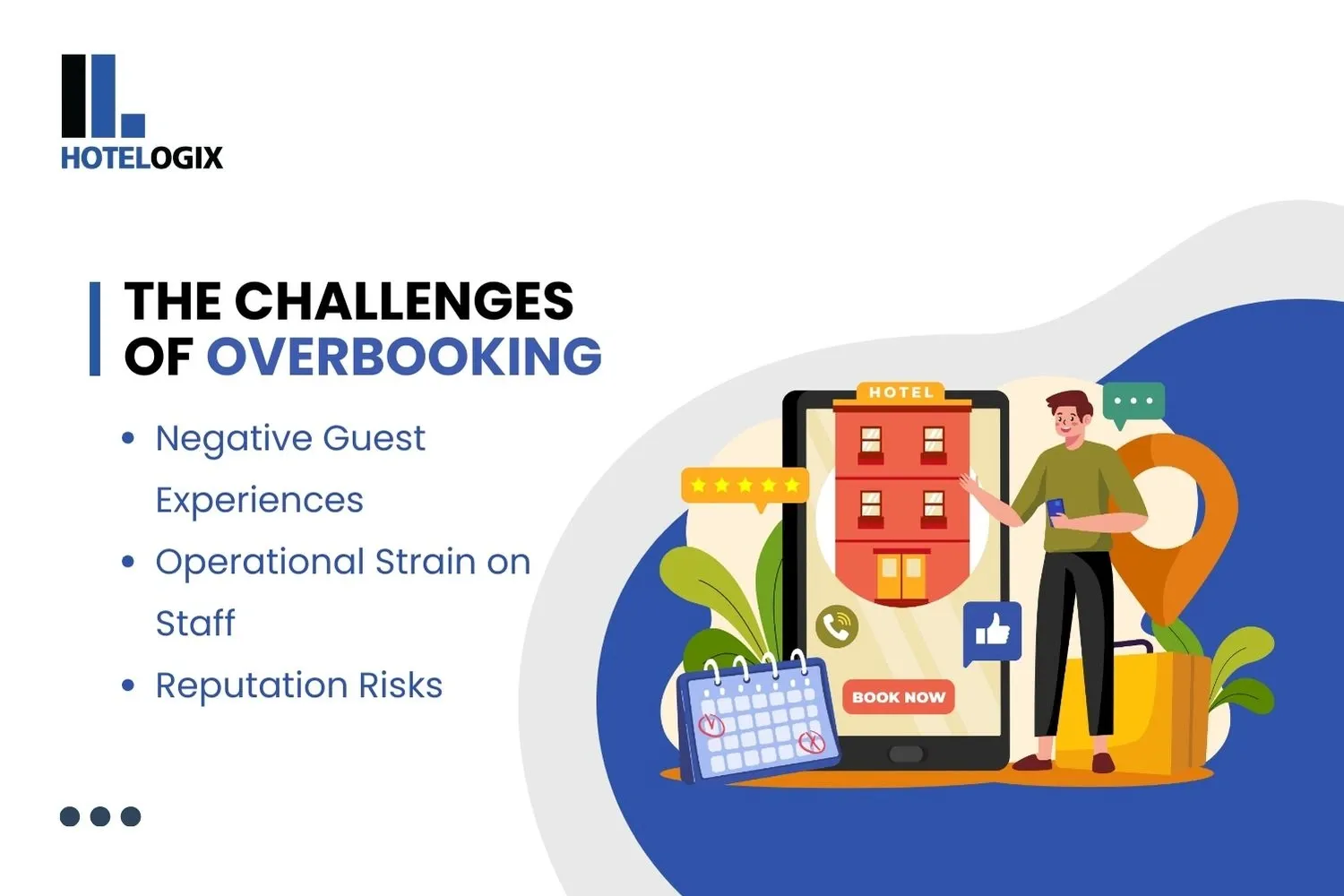Have you ever faced the awkward moment of turning away guests because you overbooked? Or worse, losing revenue because of last-minute cancellations? Overbooking is a tricky game. It can bring you more profits, or it can cost you your reputation. The good news? You can make it work in your favor with the right plan. By combining smart strategies, reliable tools, and a touch of empathy, overbooking can become a way to boost revenue without sacrificing your guests’ trust. Whether it’s no-shows, peak season chaos, or unpredictable cancellations, there’s a solution that doesn’t leave anyone disappointed.
What Is Overbooking?
There is a common practice in the hospitality industry, where hotels accept more bookings than rooms available, assuming that some people will not show up. This is also similar to selling extra concert tickets because not everyone attends. This practice is called overbooking.
While this practice can help companies optimize their room usage, there is a downside to it. When there are no chronological gaps due to passengers not showing or cancelling, everything works out fine and targets of optimally using available resources are achieved. However, when it is not performed correctly, it leads to guest dissatisfaction along with operational issues.
Why Does It Happen?
Overbooking can be done on purpose, other people intentionally use this in order to receive returns, and in other cases, it can just be a simple mistake. For instance, overbooking can be caused due to system malfunctions or inventory mishandling. If your reservation system is not well connected with online travel agencies (OTAs) then double bookings are inevitable, leading to congested scenes during check in.
Does It Work?
In this practice, there is a concern if it is being used in the right way, it should cause no concern. Overbooking does a great job of boosting revenue for the resources that are being utilized instead of serving empty rooms. The most important part is having the relevant technology and plans in place to do it orderly.
Why Do Hotels Overbook?
Overbooking isn’t just a gamble; it’s a calculated business strategy used by hotels worldwide to protect revenue and improve efficiency. Here’s why hotels take the risk:
- To Cover Cancellations and No-Shows: On average, hotels experience a cancellation rate of 20-40%, depending on the property and season. Overbooking fills these gaps, ensuring rooms don’t stay empty. For instance, a 100-room hotel with a 20% cancellation rate would need to overbook by 20 rooms just to break even.
- To Maximize Revenue: Every vacancy in a hotel room translates into a loss. Hotels use overbooking as a marketing strategy to increase occupancy rates and profitability, even if some staging rooms are left empty. As an illustration, overbooking works well when a holiday is followed by other public holidays. This will allow hotels to fill higher demand and overbooking in demo dules to avoid guests being left without a room due to cancellation of pre-booked rooms.
- To Handle Seasonal Trends: Overbooking is especially useful during high-demand periods, like festivals or business conferences, when cancellations tend to spike closer to check-in dates. It’s also a way to compensate during off-peak seasons by taking a few extra bookings, knowing some won’t show up.
The Benefits of Overbooking
When done right, overbooking becomes an effective tool to strengthen your hotel’s revenue strategy:
- Maximized Occupancy and Revenue: Overbooking ensures every room is used to its full potential. Fewer empty rooms mean more income, which is particularly crucial for smaller properties where every booking counts.
- Reduced Losses from No-Shows: No-shows and cancellations are inevitable, but overbooking minimizes their impact by proactively filling those gaps.
- Flexibility for Unexpected Changes: Overbooking gives hotels the ability to adjust to last-minute changes, such as late cancellations or early checkouts, without losing revenue.
The Challenges of Overbooking
As beneficial as overbooking can be, it comes with significant challenges that require careful handling:

- Negative Guest Experiences: Imagine a tired traveler arriving at your hotel only to be told there’s no room available. This situation can lead to complaints, frustration, and even bad reviews online, affecting your reputation.
- Operational Strain on Staff: Handling overbooking requires staff to manage complex situations, like finding alternative accommodations for guests, arranging transport, and explaining the issue—all of which can be stressful during busy hours.
- Reputation Risks: While overbooking can improve your bottom line, mishandling it can harm your reputation. Negative reviews and word-of-mouth feedback from overbooked guests can cost you future business.
How to Overbook Smartly
The key to effective overbooking is rooted in careful planning, clear policies, and the smart use of technology. Here’s how to manage it effectively:
Utilize Relevant Data
Analyze historical booking trends, cancellation rates, and seasonal patterns to estimate how many rooms you can overbook safely. For example, if your cancellation rate hovers around 15%, overbooking by that percentage can help ensure all rooms are filled without exceeding capacity.
Train Your Staff
Prepare your team to handle overbooking situations with empathy. Provide them with clear guidelines for communicating with guests and offer training in conflict resolution to maintain calm and professional interactions.
Create a Contingency Plan
Establish connections with nearby hotels to form a network of alternative accommodations. If a guest needs to be moved, having reliable partners ensures their experience remains smooth.
Be Open and Honest
If overbooking impacts a guest, communicate the situation clearly and present solutions right away. Whether it’s a complimentary meal, free transportation, or a discounted future stay, demonstrating goodwill can transform a negative experience into a positive one.
How Technology Makes Overbooking Easier
Modern hotel technology has revolutionized how overbooking is managed, making the process smoother for both hoteliers and guests.
- Real-Time Inventory Management: Tools like Hotelogix automatically sync your room availability across all booking channels, ensuring there are no accidental double bookings.
- Temp Reservation Feature: Hotelogix’s Temp Reservation allows you to temporarily hold rooms for unconfirmed bookings, releasing them automatically if the booking isn’t finalized. This prevents inventory from being blocked unnecessarily while maintaining availability for other guests.
- Data Analytics for Better Predictions: Advanced tools analyze guest behavior, such as no-show rates and booking patterns, to provide accurate recommendations on how much you can safely overbook.
Why It Matters: These tools not only streamline operations but also build guest trust by reducing errors and providing transparent communication.
Turning Overbooking Into an Opportunity
Overbooking doesn’t have to be a problem, it can be an opportunity to impress your guests with exceptional service. Here’s how:
- Offer Upgrades: If you’re out of standard rooms, upgrade the guest to a premium option or suite at no additional cost. It’s a small gesture that can leave a big impression.
- Arrange Transport and Alternatives: Partner with nearby hotels and cover transportation costs for relocated guests. This shows care and effort, ensuring the guest feels valued even during a mishap.
- Build Long-Term Loyalty: Offer affected guests incentives like discounted future stays, loyalty points, or free meals. This not only makes up for the inconvenience but also encourages them to book with you again.
A Unique Tool for Better Overbooking: Hotelogix Temp Reservation
- Keeps Track of Inventory: Holds rooms for pending bookings without manual intervention.
- Saves Time: Automatically releases rooms if the booking isn’t confirmed, reducing staff workload.
- Builds Trust: Guests receive clear communication about their booking status, avoiding misunderstandings.
Unlike other tools, this feature gives you full control over inventory, ensuring you never lose revenue to mismanagement.
Why Balance Matters
Overbooking is like walking a tightrope: it requires precision, planning, and balance. By using smart strategies, equipping your team, and leveraging technology like Hotelogix, you can turn overbooking into a profitable strategy without compromising guest satisfaction.
Conclusion
Overbooking, when approached strategically, is not just a risk—it’s an opportunity to maximize revenue while keeping your operations efficient. By carefully analyzing data, leveraging smart tools like Hotelogix’s Temp Reservation feature, and training your team to handle situations with empathy, you can turn overbooking into a powerful revenue strategy.
The secret lies in finding the right balance: use data to make informed decisions while keeping guest satisfaction at the heart of every action. This combination of smart planning and guest-centric approaches ensures your hotel not only thrives financially but also builds a loyal customer base for years to come.
By making overbooking work for you, you’re not just filling rooms you’re building trust, enhancing guest experiences, and securing your hotel’s long-term profitability


